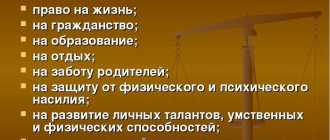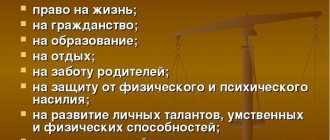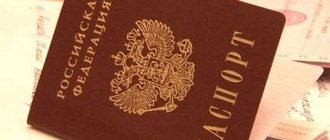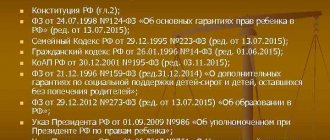How to protect the rights of minors?
In accordance with Art. 56 of the Family Code of the Russian Federation (hereinafter referred to as the Family Code of the Russian Federation), a child has the right to protection of his rights and interests protected by law, which is carried out in the manner prescribed by law, i.e. through the use of proper form and methods of protection.
The provisions of this article establish that the protection of the rights and legitimate interests of the child is carried out by parents (persons replacing them), and in cases provided for by this Code, by the guardianship and trusteeship authority, the prosecutor and the court. A minor, recognized in accordance with the law as fully capable before reaching the age of majority, has the right to independently exercise his rights and obligations, including the right to defense.
In addition, the child also has the right to protection from abuse by parents (persons replacing them).
In particular, in the event of a violation of the rights and legitimate interests of a child, including in the event of non-fulfillment or improper fulfillment by parents (one of them) of the responsibilities for raising, educating the child, or in the event of abuse of parental rights, the child has the right to independently apply for their protection to the guardianship and trusteeship authority , and upon reaching the age of fourteen years, to court.
Thus, a child who has reached the age of 14 has the right to go to court if his parents violate his property or personal non-property rights:
- live and be raised in a family (Article 54 of the RF IC)
- know your parents (Article 54 of the RF IC)
- to care from parents (Article 54 of the RF IC)
- for living together with parents (Article 54 of the RF IC)
- to be raised by his parents, ensure his interests, comprehensive development, respect for his human dignity (Article 54 of the RF IC)
- to communicate with both parents and other relatives (Article 55 of the RF IC)
- express your opinion (Article 57 of the RF IC)
- to the first name, patronymic and last name (Article 58 of the RF IC)
- to receive maintenance from their parents and other family members (clause 1 of article 60 of the RF IC)
- right of ownership (clause 3 of article 60 of the RF IC), etc.
The subjects involved in the implementation, protection and defense of the rights of the child, both in court and out of court, include:
- parents (one of them)
- persons in loco parentis (guardian, trustee, foster parent, foster carer, adoptive parent)
- guardianship authorities
- inspection for minors' affairs and protection of their rights
- prosecutor
- Commissioner for Children's Rights
- Commissioner for Human Rights
- actual educators
- persons who discovered a planted, planted child
- other persons and bodies charged by the law of the Russian Federation with the obligation to participate in the implementation, protection and defense of the rights of the child.
At the same time, the scope of powers of the persons mentioned above varies.
For example, parents and adoptive parents have the widest range of powers. These persons have the right to exercise any right of the child that he cannot independently realize.
In turn, the scope of powers of guardians, trustees, and adoptive parents is less than the scope of powers of parents and/or adoptive parents.
These persons act within the limits of the law and the agreement concluded with the guardianship and trusteeship authorities or the founder of the trust management.
However, in the event of a violation of the child’s rights by the parents, adoptive parents, or guardians or trustees, the responsibility for their protection rests primarily with the guardianship and trusteeship authorities, as well as with the prosecutor, who are obliged to protect the rights of the child, including in court:
- if it is necessary to collect alimony from parents/guardians in the event of the latter’s refusal to support the child
- in case of violation of the property rights of minors and changes in living conditions
- in case of violation of the rights of orphans and adopted children
- in case of violation of the rights of disabled children and children with disabilities
- in case of violation of the non-property rights of minors (the right to education, change of surname and name, to communicate with both parents in the event of divorce, etc.).
It should be separately noted that the competence of the guardianship and trusteeship authorities in all cases is entrusted with control over the actions of parents/guardians/trustees regarding the property rights of children.
In particular, there are a number of transactions, the conclusion of which is impossible without the approval of the guardianship and trusteeship authorities (Article 53 of the Civil Code of the Russian Federation, Article 121 of the RF IC), and which are aimed at:
- for the alienation of real estate, the co-owner of which is a child
- to change the child’s living conditions
- for collateral of real estate belonging to a child
- for renting or renting, as well as for providing free use to third parties of housing belonging to a minor child
- to renounce an inheritance belonging to a minor
- for transactions of purchase and sale of property belonging to an orphan child
- for the purchase and sale of real estate, the co-owner of which is a disabled child or a child with disabilities
- as well as other actions related to reducing the property of a minor.
Violation of the procedure for obtaining permission from the guardianship and trusteeship authorities or ignoring the opinion of these authorities on the part of parents/guardians gives the right to the guardianship or trusteeship authorities, or the prosecutor, to apply to the court with a demand to declare these transactions invalid, using restitution, in the form of returning the alienated property to ownership minor.
In addition, the guardianship and trusteeship authorities and the prosecutor also have the right to submit a claim to the court for deprivation of parental rights, for restriction of parental rights and for the collection of child support. The corresponding demand of the guardianship and trusteeship authority is formalized by a statement of claim to the court.
Also, the duties of the prosecutor, guardianship and trusteeship authorities, in order to protect the legal rights and interests of children, as well as to give an opinion on the case, include mandatory participation in the consideration of cases by courts:
- on the exercise of parental rights by a parent living separately from the child
- on deprivation of parental rights and restoration of parental rights
- on the restriction of parental rights and on the abolition of restrictions on parental rights
- on establishing the adoption of a child
- to cancel the adoption of a child.
Summarizing the above, we can conclude that the judicial protection of children’s rights in the Russian Federation is at a fairly high level. A legal framework has been created for the implementation of these rights. A system of social protection for various population groups, in particular children, is being developed. The social security system is also evolving. Various forms of assistance to children in difficult life situations have been identified.
The concept of legitimate interests of children
A child is a person from birth to adulthood (up to 18 years of age). Due to their age, these persons are a socially unprotected category of the population, since they cannot always take care of themselves. To this end, legislators have adopted a number of legal acts regulating legal relations in which minors participate.
The norms of international and national law state that every child has rights and legitimate interests that cannot be violated by anyone. Many countries have ratified acts of international significance and adopted many of their own documents, the main task of which is to protect the rights, freedoms and interests of young citizens.
Where are the rights and interests of children secured?
Many legislative documents reflect the position of protecting children's rights: the Universal Declaration of Human Rights, the Convention on the Rights of the Child, the Constitution of the Russian Federation, the Family Code, federal laws of the Russian Federation, laws of constituent entities of the Russian Federation and local regulations.
The term “best interests of the child” was first used in the Universal Declaration of Human Rights of 1948. Its essence is to provide the most favorable living conditions for the child as much as possible. What could this mean?
For example, favorable physical, mental, spiritual and psychological development, normal conditions for adaptation in society, guarantees of freedom and equality. In accordance with this document, responsibility for children until they reach adulthood rests with their parents.
Another equally important piece of legislation protecting the interests of children is the Convention on the Rights of the Child. It was adopted in 1989 and ratified by Russia a year later. Since September 15, 1990, the Convention has extended its effect to Russians. All other regulations adopted in the Russian Federation cannot contradict the Convention on the Rights of the Child. Based on the tenets of the Convention, we can conclude that the interests of the child are higher than those of the state, public or family .
The Constitution of the Russian Federation contains a norm providing for the protection of childhood by the state (Article 38). The Family Code also stipulates that childhood is protected by the state.
Federal Law No. 124 “On the Basic Guarantees of the Rights of the Child in the Russian Federation” establishes a list of the rights and legitimate interests of children in the legal, social and economic spheres of life.
At the local level, local legal documents and programs are systematically developed to ensure that children exercise their rights.
What legal interests does the child have?
At first glance, it is quite difficult to answer unequivocally what legitimate interests of children the state protects. Let's try to understand this issue from a legal point of view.
If we analyze the above regulations, we can conclude that the legal rights and interests of children are as follows:
- Every baby has the right to life.
- At birth, a newborn has the right to a name and citizenship.
- A child has the right to protection from any form of discrimination (based on skin color, gender, language, religion, race, belief, nationality, health status, social and property origin, etc.).
- All children should be raised in a family and receive care and education from their parents. If the child’s parents live in different countries, he has the right to maintain contact with both of them (including leaving his home country and entering it back).
- Children have the right to freely express their thoughts (from the age of 10 in Russia, children’s opinions are taken into account in court proceedings when the dispute directly affects their interests).
- Until adulthood, the interests of children are represented by their legal representatives (parents, adoptive parents, guardians). This may be representation during legal transactions, contacting government agencies, etc.
- A child can profess any religion that is not prohibited in the state.
- All children have the opportunity to attend educational institutions (kindergartens, schools), and the state must assist in this (open and finance appropriate institutions).
- The child has the right to receive vocational and higher education and to have these forms of education available to all categories of the population.
- Children deprived of parental care should be under special protection of the state. They must be placed in specialized institutions, under guardianship, or put up for adoption.
- Children with a disability status have the right to lead a full life in the most comfortable conditions that the state should create for them (including the right to medical, recreational, social services, work, and material support).
- No child should be subjected to forced labor. A child can engage in labor activity from the age of 16, taking into account the standards set forth by labor legislation for this age category (number of working hours, length of working time, restrictions on attracting minors to work at night, overtime, etc.).
- Minors have the right to protection from sexual violence in all forms. The state is obliged to take strict measures at the legislative level to prevent these phenomena.
- Until adulthood, a child cannot be called up to serve in the army or other military formations.
- Punishments for crimes committed such as the death penalty and life imprisonment are not applied to minors. In case of detention, arrest of a minor or during an investigation, the requirements of the law must be strictly observed, namely: detention is used as a last resort, its terms must not be exceeded, and during investigative measures the young citizen must be provided with legal assistance.
Assistance in realizing the legitimate interests of children
As we see, in all legislative documents there is a thesis that it is the state that should in every possible way contribute to the protection of the interests of children. How does this actually happen?
- Assistance to children in the realization of their rights and interests is carried out through government bodies and representatives of these bodies by adopting regulations, conducting methodological and explanatory work with children about their rights and responsibilities.
- Teachers, sociologists, psychologists, and medical workers also participate in the process aimed at ensuring the protection of the rights and interests of children.
- An important role is played by public associations that help children develop skills in applying their legal rights.
- And the most important role in the process of realizing children’s rights is played by parents or their other legal representatives (guardians). It is these persons who help the child independently perform certain actions, taking into account age and scope of legal capacity.
In cases where the rights and legitimate interests of a child are violated, representatives of the minor may go to court. On behalf of the child, statements of claim and other procedural documents are filed by his legal representative (parent, adoptive parent, guardian or representative of the organization in whose care the child is).
Depending on the circumstances of the situation, the guardianship and trusteeship authorities and the prosecutor's office may be involved in the judicial process in which the interests of a minor are affected.








